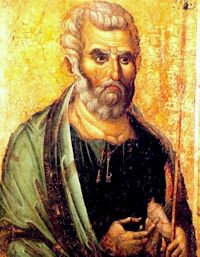Ordinary Time: January 29th
Thursday of the Third Week of Ordinary Time
Other Commemorations: St. Gildas the Wise, Abbot (RM)
» Enjoy our Liturgical Seasons series of e-books!
Before the reform of the Roman Calendar this was the feast of St. Francis de Sales which is now celebrated on January 24.
In the Gospel reading today, Our Lord tells us that a lamp is brought in to be placed on a lampstand so that everything that is hidden will be made visible and everything that is secret will come to light. Jesus is the Light, and He comes to dwell within our hearts so that everything which is not of Him will be made clear to us, so that we will be able to see anything which is not pleasing to God. The question, of course, that we really need to ask is “Do we really want to see it?” because for too many of us, we like the things that are not of God. We are rather attached to all of those things and we really do not want to give them up. And so when the Lord allows His light to shine upon them, we look the other way. We are very quick to put a bushel basket over the lamp because we choose these other things instead of the Lord, but what we really need to do is allow the light to shine and allow what is hidden to be revealed. If there is something in the way then we need to get it out of there.
It is a simple task on one level, that is, we need to bring it to Confession. We need to expose any hidden sins in the light of Confession. No matter how shameful or how embarrassing they might be, it does not matter because we are bringing it to the Lord and He will remove it. If we do not deal with it, knowing fully well that it is there, and we refuse to bring it to the light, then what we are doing is to say, “We will wait for the Day of Judgment and we will stand before the Lord with these sins still on our souls and we will have to answer to them.” But if we bring them to Our Lord and we confess them, they will be removed, and we will not have to answer to them on the Day of Judgment. That is part of what remains hidden within us. — Fr. Robert Altier
Things to Do:
- Bake a Menorah cake with today's Gospel about light in mind. Instead of just putting the 8 candles add a larger candle to represent Christ, the Light of the world.
- Discuss examination of conscience with your children.
St. Gildas the Wise
He was probably born about 517, in the North of England or Wales. His father's name was Cau (or Nau) and that he came from noble lineage.
He lived in a time when the glory of Rome was faded from Britain. The permanent legions had been withdrawn by Maximus, who used them to sack Rome itself and make himself Emperor.
Gildas noted for his piety was well educated, and was not afraid of publicly rebuking contemporary monarchs, at a time when libel was answered by a sword, rather than a Court order.
He lived for many years as an ascetic hermit on Flatholm Island in the Bristol Channel. Here he established his reputation for that peculiar Celtic sort of holiness that consists of extreme self-denial and isolation. At around this time, according to the Welsh, he also preached to Nemata, the mother of St David, while she was pregnant with the Saint.
In about 547 he wrote De Excidio Britanniae (The Ruin of Britain). In this he writes a brief tale of the island from pre-Roman times and criticizes the rulers of the island for their lax morals and blames their sins (and those that follow them) for the destruction of civilization in Britain. The book was avowedly written as a moral tale.
He also wrote a longer work, the Epistle. This is a series of sermons on the moral laxity of rulers and of the clergy. In these Gildas shows that he has a wide reading of the Bible and of some other classical works.
Gildas was an influential preacher, visiting Ireland and doing missionary work. He was responsible for the conversion of much of the island and may be the one who introduced anchorite customs to the monks of that land.
He retired from Llancarfan to Rhuys, in Brittany, where he founded a monastery. Of his work on the running of a monastery (one of the earliest known in the Christian Church), only the so-called Penitential, a guide for Abbots in setting punishment, survives.
He died around 571, at Rhuys. The monastery that he had founded became the center of his cult.
St. Gildas is regarded as being one of the most influential figures of the early English Church. The influence of his writing was felt until well into the Middle Ages, particularly in the Celtic Church.
Symbols and Representation: with a bell
Highlights and Things to Do:
- Read St. Gildas's work The Ruin of Britain at CCEL.
- Read about St. Gildas:






